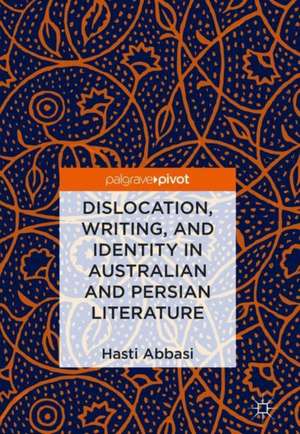Dislocation, Writing, and Identity in Australian and Persian Literature
Autor Hasti Abbasien Limba Engleză Hardback – 14 sep 2018
| Toate formatele și edițiile | Preț | Express |
|---|---|---|
| Paperback (1) | 346.96 lei 38-44 zile | |
| Springer – 24 ian 2019 | 346.96 lei 38-44 zile | |
| Hardback (1) | 415.95 lei 43-57 zile | |
| Springer International Publishing – 14 sep 2018 | 415.95 lei 43-57 zile |
Preț: 415.95 lei
Nou
Puncte Express: 624
Preț estimativ în valută:
79.62€ • 86.51$ • 66.92£
79.62€ • 86.51$ • 66.92£
Carte tipărită la comandă
Livrare economică 21 aprilie-05 mai
Preluare comenzi: 021 569.72.76
Specificații
ISBN-13: 9783319964836
ISBN-10: 3319964836
Pagini: 95
Ilustrații: X, 104 p.
Dimensiuni: 148 x 210 x 10 mm
Greutate: 0.29 kg
Ediția:1st ed. 2018
Editura: Springer International Publishing
Colecția Palgrave Pivot
Locul publicării:Cham, Switzerland
ISBN-10: 3319964836
Pagini: 95
Ilustrații: X, 104 p.
Dimensiuni: 148 x 210 x 10 mm
Greutate: 0.29 kg
Ediția:1st ed. 2018
Editura: Springer International Publishing
Colecția Palgrave Pivot
Locul publicării:Cham, Switzerland
Cuprins
1. Introduction: Dislocation and Writing.- 2. Writing in Exile.- 3. Malouf’s An Imaginary Life.- 4. Parsipur’s Women Without Men and Iranian Diaspora Women’s Literature.- 5. Conclusion.
Notă biografică
Hasti Abbasi teaches Bachelor of Arts courses at Griffith University, Australia. Abbasi has been short listed for the 2018 Viva la Novella VI Prize for her novella And the Raindrops Fill the Sea.
Textul de pe ultima copertă
This study aims to foreground key literary works in Persian and Australian culture that deal with the representation of exile and dislocation. Through cultural and literary analysis, Dislocation, Writing, and Identity in Australian and Persian Literature investigates the influence of dislocation on self-perception and the remaking of connections both through the act of writing and the attempt to transcend social conventions. Examining writing and identity in David Malouf’s An Imaginary Life (1978), Iranian Diaspora Literature, and Shahrnush Parsipur’s Women Without Men (1989/ Eng.1998), Hasti Abbasi provides a literary analysis of dislocation, with its social and psychological manifestations. Abbasi reveals how the exploration of exile/dislocation, as a narrative that needs to be investigated through imagination and meditation, provides a mechanism for creative writing practice.
Caracteristici
Provides a case study for understanding exile literature broadly Examines theories of nomadism, dislocated women, and other socio-cultural and historical aspects of feminist and women’s writing Investigates the impact of dislocation on literary production and creative writing
